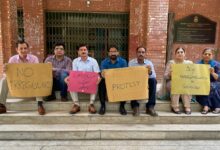SSDO demands virtual sessions for pre-budget discussion in National and Provincial Assemblies
ISLAMABAD: As per budget rules pre-budget sessions are mandatory before presenting the budget but due to corona the national and provincial assembly is not able to create any debate on the upcoming annual budget. It is imperative for all the elected members and local stakeholders to take part in the budget process. Federal & provincial Governments should devise a mechanism to take the feedback of members of provincial and national assembly through emails and other virtual options. Sustainable Social Development Organization (SSDO) raised a demand for virtual session of the parliaments to discuss the budget priorities for the upcoming fiscal year 2020-21.
Budget is a planning document both for the government and the businesses in a country. People adjust their expectations about the business environment and public sector programs and decide where they should park their investments in anticipation of better return on investments. In a nutshell, a budget it is a key government document which has impact on jobs, businesses, and other aspects of economic and social life. . In this way, the budget has multiple stakeholders both from the supply and demand side of the financial equation.
Looking at from this angle, SSDO demands that while budgets are in the making, the federal and provincial government budgets must be debated in the national and provincial assemblies. The organization demands that budget policy should not be treated as a secret during the preparation phase. Rather its broader contours such as investment decisions in the social development sector, pro-poor expenditures, and fiscal policy measures such as taxation must be debated in the federal and provincial assemblies as well as in the Senate of Pakistan.
“SSDO believes that open governments and open budgets help fight against corruption bringing in transparency and accountability mechanisms along with participatory and inclusive approach to budget making”.
The importance of an open debate has actually increased COVID-19 demands change in the allocation of resources for social development such as public health, pro-poor expenditures such as social protection, and also public sector investments in the job creating sectors. It also needs serious debate about domestic and foreign resource mobilization to meet the emerging challenges during the COVID-19. It has become almost clear that informal sector employments are the worst hit and around 18 million workers are going to be unemployed so the need of income support shall increase. It is also clear that with the increase in number of cases, our healthcare system shall come under huge stress demanding resources for COVID-19 tests, personal protection equipment, medicines, and life-support medical equipment. All these demands are arising while Pakistan’s economy is shrinking and is predicted to undergo a negative one percent growth in 2020-2021. These challenges are enormous and Pakistan can successfully cope with the emerging situation if an open and transparent debate is generated and broad-based consultations are held at the earliest possible.
“SSDO believes that budgets be made inclusive, accountable, responsive, and answerable to the stakeholders. In lieu of this, SSDO louds recent initiatives of the government of Punjab which has sought recommendations from the general public as well”.
Syed Kausar Abbas, Director of Sustainable Social Development Organization (SSDO) while talking to media said raised demand that pre-budget sessions are organized immediately and suggestions must also be sought from policy research institutions as well as public interest organizations through government organized online debates. As a public interest organization SSDO demands that budget should ensure that no one left behind due to unusual economic, social and psychological stress on individuals and households due to COVID-19. However, how to mobilize resource to fulfill the promise needs to be debated in pre-budget sessions in the parliaments.





